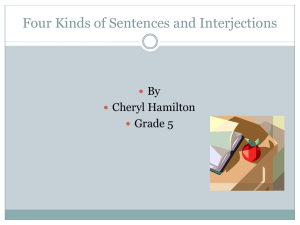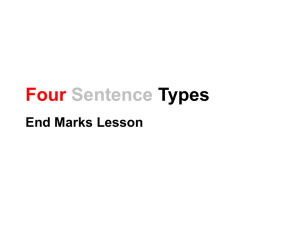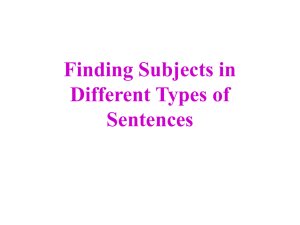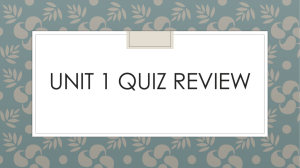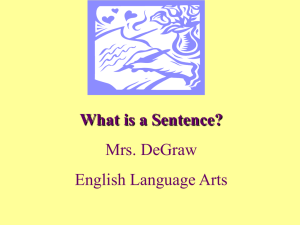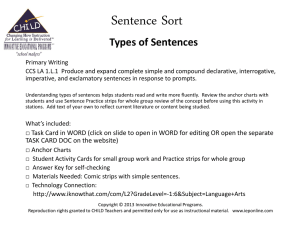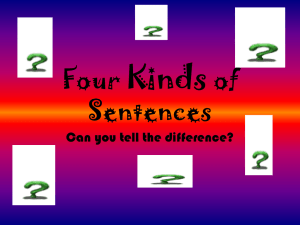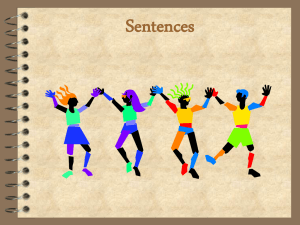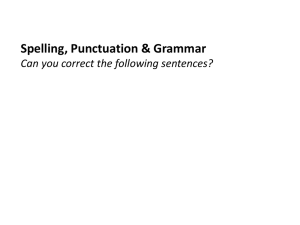Imp-Int-Exclam Sentences
advertisement
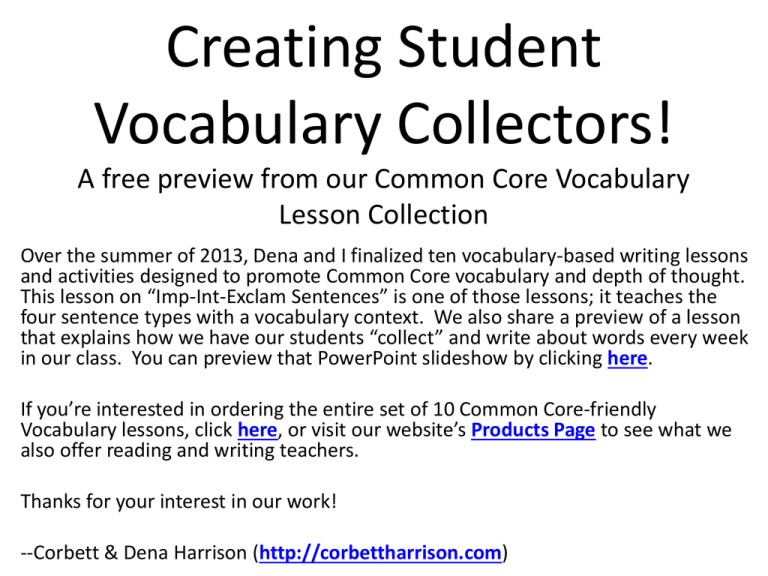
Creating Student Vocabulary Collectors! A free preview from our Common Core Vocabulary Lesson Collection Over the summer of 2013, Dena and I finalized ten vocabulary-based writing lessons and activities designed to promote Common Core vocabulary and depth of thought. This lesson on “Imp-Int-Exclam Sentences” is one of those lessons; it teaches the four sentence types with a vocabulary context. We also share a preview of a lesson that explains how we have our students “collect” and write about words every week in our class. You can preview that PowerPoint slideshow by clicking here. If you’re interested in ordering the entire set of 10 Common Core-friendly Vocabulary lessons, click here, or visit our website’s Products Page to see what we also offer reading and writing teachers. Thanks for your interest in our work! --Corbett & Dena Harrison (http://corbettharrison.com) Vocabulary Collectors Welcome! This slide presentation will teach you how to create an Imperative, Interrogative, and Exclamatory Set of Sentences based on one of the vocabulary words you have collected for the week. It will also provide the criteria for you to be able to receive full credit for your ImperInter-Exclam Sentence Set. Most of the sentences you speak are declarative in nature; you’re simply stating ideas. There are three other sentence types that we use when speaking and writing: imperative, interrogative, and exclamatory. This vocabulary writing activity asks you to not only create example vocabulary sentences for each of these three sentence types, but it also asks you to experiment with contextual clues to prove that you understand your word’s meaning. Meaningful writing activity = Imper-Inter-Exclam Sets! Vocabulary Collectors imperative (adjective) — 1. describing something of vital importance; 2. describing a sentence that makes a command. My Vocabulary Haiku: Approaching the stream, (5) Sipping that imperative (7) Water. Survival. (5) Definition #1 Many English words have more than one meaning listed in the dictionary. This means that the vocabulary word can be used in a variety of ways…or contexts…and depending on how the word is used determines the meaning you want to write down in your vocabulary collections. So if you read this sentence-- “The imperative CPR lesson ended up saving a life that day.” --you would need to ask, “Which of the word’s two meanings is the right one based on how the word is used alongside the other words?” Meaningful writing activity = Imper-Inter-Exclam Sets! Vocabulary Collectors interrogatative (adjective) — 1. describing something that is questioning; 2. describing a sentence that asks a question. Interrogative is a part of an “E.G.O.T.” Noun Verb Adjective Adverb interrogation interrogate interrogative interrogatively because it has all four forms! My silly E.G.O.T. sentence: When the captain interrogates a criminal, he begins that interrogation by asking his partner to never interrogatively interrupt any of his interrogative inquiries to the prisoner. Here’s another 25-cent vocabulary word that has more than one meaning in the dictionary. So if you read this sentence-- “Frank’s interrogative eyebrows always arch when he hears debatable claims from his teachers and classmates.” --you would need to ask, “Which of the two meanings is the right one based on how the word is used alongside the other words?” Hey! What else besides eyebrows and sentences might be described with this vocab word? Discuss it with a partner. Meaningful writing activity = Imper-Inter-Exclam Sets! Vocabulary Collectors exclamatory (adjective) — 1. describing something that makes a protest or makes an outcry; 2. describing a sentence that requires an exclamation point at the end. root analysis: ex (Greek root, meaning ‘out’) + clamare (Greek root, meaning ‘cry’) Three related words: clamor (an outcry from a crowd), claim (something you cry out loud in a debate), acclaim (something that makes you cry out using praise for someone or something). Here’s a final 25-cent vocabulary word that has more than one meaning in the dictionary. Click to see my analysis! So if you read this sentence -- “The unexpected and unfair change to the policy was responsible for an exclamatory cry from the employees.” -- you would need to ask, “Which of the two meanings is the right one based on how the word is used alongside the other words?” Hey! What else besides cries and sentences might be described with this word? Come up with three ideas. Meaningful writing activity = Imper-Inter-Exclam Sets! Vocabulary Collectors There are Four Sentence Types in English and They Have Fancy Names: declarative imperative (adjective) describing a sentence that makes a statement and requires a period at the end. Most spoken and written English sentences are declarative. (adjective) describing a sentence that makes a command. A period or exclamation point can be used, based on the emotional delivery of the command. Examples: I like to eat dill pickles. The stranger helped me out. Examples: Find me a pencil. Leave this house immediately! interrogative exclamatory (adjective) describing a sentence that asks a question and requires a question mark. (adjective) describing a sentence that makes a strong emotional outcry. Examples: Are you serious about that? When did the movie let out? Examples: That is so incredibly ridiculous! I am in love with dill pickles! Meaningful writing activity = Imper-Inter-Exclam Sets! Vocabulary Collectors Here is a fun vocabulary word—loquacious—used in all four sentence types! declarative imperative The loquacious student earned a detention Stand up during the debate and be after being warned about not listening to loquacious! The quieter arguers rarely win the teacher’s important directions. a debate match. Read these four sets of sentences I have created for you. Can you tell me what loquacious means based on the context clues I have left for you in my sentences? Be smart and read the clues! interrogative Does he not realize that being too loquacious on a first date turns a girl off? Most girls like both conversation and moments of silence to think. exclamatory If you can’t stop being loquacious, I am going to scream like crazy! I need you to not say a word to me and walk away. Meaningful writing activity = Imper-Inter-Exclam Sets! Vocabulary Collectors loquacious (adjective) — tending to talk a great deal; overly chatty. Imperative: Stand up during the debate and be loquacious! The quieter arguers rarely win a debate match. Interrogative: Does he not realize that being too loquacious on a first date turns a girl off? Most girls like both conversation and moments of silence to think. Exclamatory: If you can’t stop being loquacious, I am going to scream! I need you to not say a word to me and walk away. One of your new vocabulary options each week is to take one of your words and create a set of three Imper-InterExclam sentences. Each sentence type must be followed by a second sentence that is declaratory in nature. With your three sets of sentences, you must leave context clues so that someone who didn’t know the word could make a wise guess about its meaning. Do you see how each sentence type is followed by a declarative sentence in my examples? Notice my context clues? Meaningful writing activity = Imper-Inter-Exclam Sets! Vocabulary Collectors sexton (noun) — a person who works for a church by attending its grounds and ringing its bells during services. Imperative: How about? “Find me the sexton. Our churchyard needs some landscaping done.” Interrogative: How about? “What’s a sexton get paid? It depends on how often he is required to ring the church bell.” Exclamatory: How about? “What a mess! Our sexton needs to start doing his job and shovel snow before Sunday service.” Let’s practice with an older word that comes with a specific context: sexton. Here is a poem to teach and discuss; it uses this older vocabulary word. What imperative command followed by a declarative sentence could you write for the word sexton? Leave a clue! What interrogative question followed by a declarative sentence would you write? What exclamatory and emotional statement followed by a declarative sentence might you write? Meaningful writing activity = Imper-Inter-Exclam Sets! Vocabulary Collectors sexton Imperative: How about? “Find me the sexton. Our churchyard needs some landscaping done.” The ultimate goal of this activity is that—if someone read your three sets of sentences without seeing the definition first—a person could make an intelligent guess about the vocabulary word’s meaning and come up with a picture in his or her head of the word. Interrogative: How about? “What’s a sexton get paid? It depends on how often he is required to ring the church bell.” Think someone could do that with these sentences and the word sexton here? Exclamatory: How about? “What a mess! Our sexton needs to start doing his job and shovel snow before Sunday service.” And hey, if you happen to learn the names of the four sentence types in English, that wouldn’t be such a bad thing either! Enjoy this activity now! Meaningful writing activity = Imper-Inter-Exclam Sets! Vocabulary Collectors Imper-Inter-Exclam Sentence Sets Rubric: 4 points 3 points 2 points 1 point The student’s sentences do all: The student’s sentences do three: The student’s sentences do two: The student’s sentences do one: • Each imperative, interrogative, and exclamatory sentence is followed by a declarative sentence. • Each imperative, interrogative, and exclamatory sentence is followed by a declarative sentence. • Each imperative, interrogative, and exclamatory sentence is followed by a declarative sentence. • Each imperative, interrogative, and exclamatory sentence is followed by a declarative sentence. • There are great context clues. • There are great context clues. • There are great context clues. • There are great context clues. • End punctuation (!, ?, and .) is correct. • End punctuation (!, ?, and .) is correct. • End punctuation (!, ?, and .) is correct. • End punctuation (!, ?, and .) is correct. • Spelling is correct. • Spelling is correct. • Spelling is correct. • Spelling is correct. Click here for a printable version of this rubric for your students. Meaningful writing activity = Imper-Inter-Exclam Sets! Vocabulary Collectors Imp-Int-Exclam Sentences Rubric: 4 points 3 points The student’s sentences do all: The student’s sentences do three: • Each imperative, interrogative, and exclamatory sentence is followed by a declarative sentence. • There are great context clues. • • End punctuation (!, ?, and .) is correct. • End punctuation (!, ?, and .) is correct. • Spelling is correct. • Spelling is correct. • Each imperative, interrogative, and exclamatory sentence is followed by a declarative sentence. There are great context clues. Check out the following student samples. Decide if they should earn a 3 or a 4: Online Student Samples to Analyze: Sample #1 - Lauryn Sample #2 - Patrick Sample #3 - Hannah Sample #4 - Anna Sample #5 - Ryan Encourage Your Teacher to Join: Our Vocabulary Collectors Page at our Ning allows any teacher to post his/her students’ vocab samples. Meaningful writing activity = Imper-Inter-Exclam Sets! Creating Student Vocabulary Collectors! Order the entire product for access to all ten vocabulary lessons and writing activities! Ten Vocabulary Lessons & Techniques for Writing about new Vocabulary Words: Personifying Vocabulary Vocabulary Haikus Mr. Stick Vocab Cartoons Vocabulary Symbolism Showing Vocab Sentences Root Analysis & Related Words The Antonym & Synonym Game E.G.O.T.-ting Sentences Sausage Sentences Imp-Int-Exclam Sentences If you’re interested in ordering the entire set of 10 Common Core-friendly Vocabulary lessons and writing challenges, click here, or visit our website’s Products Page to see what we also offer reading and writing teachers. Thanks for your interest in our work! --Corbett & Dena Harrison (http://corbettharrison.com)
